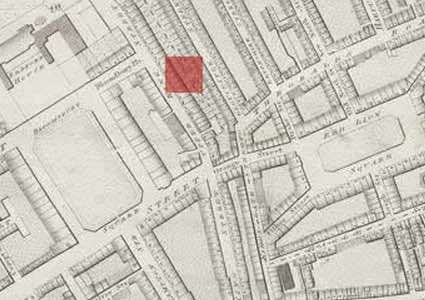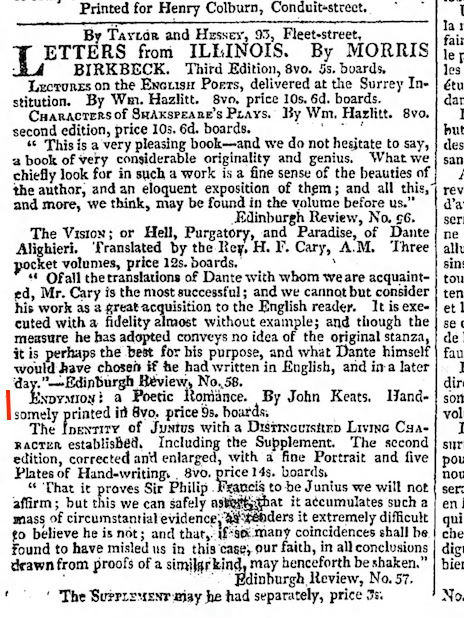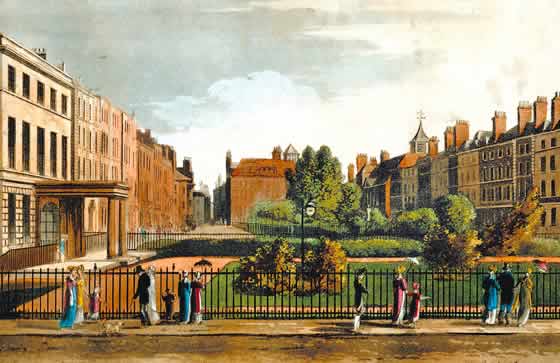24 October 1818: Romantic Encounters, Sublime Solitude, & Passion for the Beautiful; Keats’s Predicted Greatness
34 Gloucester Street, London


The home of the enigmatic (at least for Keats) Mrs. Isabella Jones, with whom Keats has had an earlier romantic encounter near Hastings (in an adjacent village with the delightful name of Bo-Peep), May 1817.
On this day, a week before his twenty-third birthday, Keats has passed Isabella on the street. He turns back to greet the stylish and
attractive woman, and, probably after some niceties and a short detour to see one
of her
friends who managed a boarding school, he presses a little so that he can walk her
home, to 34
Gloucester Street, off Queen Square, wondering all the while what it might lead to.
As he will
write in a letter to his brother and sister-in-law in America (George and Georgiana)
that describes the encounter, She has always been an enigma to me
(24 Oct 1818). They
spend some time in, he notes, her very sitting room, with all its books, pictures,
statues,
aeolian harp, music, and liquor—not to mention a couple of birds as well as a bronze
statue of
Napoleon, which might suggests something about her free-thinking yet genteel manner.
In a
typical Keatsian fashion, he uses a sensuous metaphor to describe the room: its tasty,
he writes. But nothing romantic happens. Keats, however, seems to have thought a little
kiss
might not be a bad way to part. Isabella, without any prudishness or offence, thinks
otherwise. It seems a nice hand-pressing will have to do. Keats recalls that in his
earlier
encounter he had warmed with her before and kissed her,
though what exactly this means
is unclear—he differentiates warmed
from kissed,
so it could be something more
or something less than kissing. At this point, he concludes I have no libidinous thought
about her
(14-31 Oct 1818), though it seems otherwise. Keats then later notes he
receives much game—including pheasant—from Mrs. Jones, which he re-gifts. (This, of
course,
tempts a witty comment about what exactly, in this particular case, the bird-in-the-hand
proverb might suggest.) Keats also expresses that he would at some point like to develop
his
friendship with her—for, as he writes, her mind.
Though this clearly suggests some
desire on the part of Keats to develop their friendship, Keats and Isabella agree
to keep
their common acquaintances
from knowing the exact history of their relationship; but
everything tells us she has significant artistic and cultural sensibilities, and that
Isabella
is fairly well acquainted with others in Keats’s circle.
[For more about her and Keats’s first meeting with Isabella Jones, see May 1817.]
Mrs. Jones may be responsible for suggesting the Eve of St. Agnes as a poetic topic to Keats, which, in the first few months of 1819, he takes up (remarkably so!) in an engaging and remarkably atmospheric narrative poem. The poem contains a sexual encounter that, controversially, exists somewhere between an allegory of the sensual imagination and flesh-and-blood rape, coloured by deception.
Keats this month also expresses some barely closeted feelings about a certain Jane Cox, whom he meets via the Reynolds sisters. Within
a longer journal letter to his brother and sister-in-law in America, Keats on 14 October
bothers to describe her; she has, in fact, made Keats a little hot and bothered: Miss
Cox, he
writes, has fine eyes and fine manners,
and When she comes into a room she makes the
impression the same as the beauty of a leopardess [. . .] a man is drawn toward her
with a
magnetic power.
She intrigues him, and he confesses to losing some sleep thinking about
her.


In this journal letter (14-31 Oct) in which he writes about his personal circumstances,
Keats
also communicates, I hope I shall never marry.
He says, Solitude is sublime,
that there is Pleasure in Solitude,
and that he has a barrier against Matrimony
which I rejoice in.
The comments really point to Keats’s desire to find, as it were,
space to study, think about, and compose poetry.
The interesting feature about the ideas he develops this October is how he plays off
the
mighty abstract Idea of Beauty,
his strengthening imagination, and concerns about his
powers for poetry
against domestic happiness.
As mentioned, his desire for and
love of poetical solitude greatly outweigh any other personal circumstance. Keats’s
commitment
to poetry is clear and his path extraordinarily confident: I think I shall be among the
English Poets after my death,
he writes 14 October to George Keats. Ten days later, he sets out his determination and
direction: The only thing that can ever affect me personally for more than one short
passing day, is any doubt about my powers for poetry—I seldom have any.
And then a few
days later, in writing to Richard Woodhouse
and attempting to muster some resolve—and after articulating his own poetical character
as
the camelion Poet
—he writes, I will assay to reach to as high a summit on Poetry
as the nerve bestowed upon me will suffer
(letter, 27 Oct). As he assesses his own
happiness in light of solitude, he confesses the yearning Passion I have for the beautiful,
connected and made one with the ambition of the intellect.
This appears to be a passing
train of thought—Enough of this,
he adds—but the idea is clearly definitive in terms of
his progress: to embrace the truthfulness of beauty in a measured, controlled manner,
and to
attempt to carefully measure his own desire and abilities; these set the way for the
qualitative leap poetry takes into 1819.
Keats’s accumulating comments about poetic directions and conditions, as well as his confidence in his poetic powers, thus point to lurking, immanent achievement. He is reaching toward, and ready for, the power of poetry. For us, though, with the hindsight of knowing his actual achievement in 1819, this is an easy prediction.
But this prediction of greatness is not just Keats’s. Woodhouse, who is realistic
and
tough-minded in his ideas about poetry and poetic greatness, this month writes to
a third
party at length about Keats’s poetic merits.
To Mary Frogley on 23 October, he
resolutely expresses his belief in Keats’s greater gifts: such original genius, I verily
believe, has not appeared since Shakespeare & Milton.
He knows Endymion displays the faults of early work, but Reynolds puts
himself out on a limb by prophesying now, while Keats is unknown unheeded, despised [and .
. .] neglected],
and if Keats lives to a usual age, and critics do not drive him from
the free air of the poetic heaven before his Wings are fullfledged,
that he will rank
on a level with the best of the past or of the present generation; and after his death
will
take his place at their head.
This is indeed a fully-felt conviction, but Woodhouse
claims he makes it in the spirit of true criticism.
Well, it turns out Woodhouse was
correct, except inasmuch as Keats’s wings will appear within months, not years. Winter
is
coming, with Spring not far behind.


